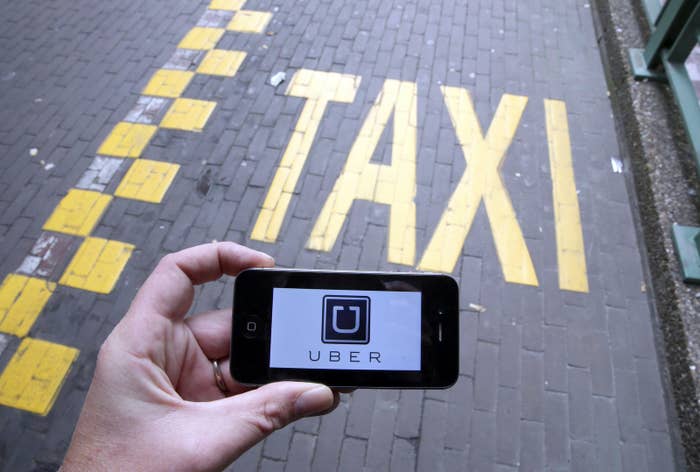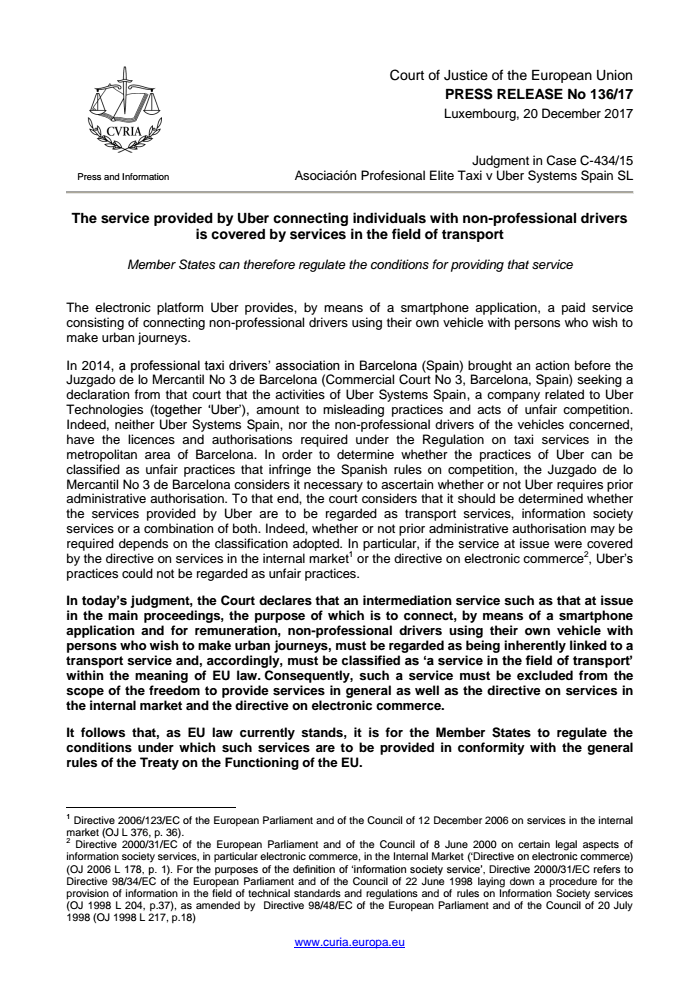
A long-awaited ruling by the European Court of Justice (ECJ) has stated that Uber is a taxi service, not a tech company, and therefore must to adhere to national transport regulations in individual European companies.
The ruling, announced on Wednesday morning, represents a significant blow to Uber. The ride-hail company had hoped to be recognized as a digital platform, which would have meant it was only subject to Europe-wide rules.
#ECJ rules Uber is a transport service and so can be regulated as such at national level https://t.co/qPh2DS0Dbt
"The electronic platform Uber provides, by means of a smartphone application, a paid service consisting of connecting non-professional drivers using their own vehicle with persons who wish to make urban journeys," the ECJ's ruling read.
It concluded that it therefore "must be regarded as being inherently linked to a
transport service and, accordingly, must be classified as ‘a service in the field of transport’ within the meaning of EU law".
"Consequently," it said, "such a service must be excluded from the scope of the freedom to provide services in general as well as the directive on services in the internal market and the directive on electronic commerce."
The case was first raised by taxi drivers in Barcelona in 2014, who complained that Uber infringed Spanish competition rules and claimed it did not have authorization to operate as a taxi service.
The Barcelona cab drivers went on a 24-hour strike to protest against the app, but the court declared that its status as a transport company had to be confirmed before Uber's operation could be deemed as amounting to "unfair practices".

Uber has argued throughout the case that it should be considered a tech company, but downplayed the impact of the decision in a press statement immediately after the final verdict.
"This ruling will not change things in most EU countries where we already operate under transportation law," an Uber spokesperson said. "However, millions of Europeans are still prevented from using apps like ours. As our new CEO has said, it is appropriate to regulate services such as Uber and so we will continue the dialogue with cities across Europe. This is the approach we’ll take to ensure everyone can get a reliable ride at the tap of a button."
The announcement represents a significant victory for Spanish taxi drivers after years of campaigning against the company.
On Monday, Facebook group Taxistas de Barcelona posted a series of Tweets showing customers complaining about Uber, saying the sector needs to "bust those who are disloyal" and "get people to want to come with us!"
On Twitter, taxi campaign groups from Barcelona also celebrated the news. Elite Taxi BCN, which campaigns for the rights of drivers in the city, tweeted: “Today is a great day, we trust in the justice system to declare Uber a transport company”.
#FelizMartes hoy es un gran día, confiamos en la justicia para que declare a Uber una Compañía de Transporte. Sigue… https://t.co/JuYuNkq09I
Despite Uber's apparent resolve, Wednesday's ruling represents a bombshell for its policy team, which has been facing growing resistance from municipal authorities across Europe.
The campaign by taxi drivers in Barcelona echoes a resistance from local governments in the UK, where last week York became the third city to effectively ban Uber by voting against renewing its license.
The UK's Trades Union Congress, which has slammed the company for not giving its drivers a minimum wage or holiday pay, welcomed the verdict.
“Uber must get its house in order and play by the same rules as everybody else," said General Secretary Frances O’Grady.
“Advances in technology should be used to make work better. Not to return to the type of working practices we thought we’d seen the back of decades ago.”

